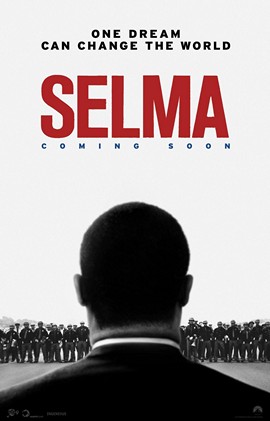A Movie You Should See: Selma
I'm trying to actually see some of the Oscar bait this season, and one film I finally got to watch recently was Selma. I'd been really looking forward to this one,[ref] Other movies at the top of my list are Whiplash, and, to a lesser extent, Birdman. [/ref] and was not disappointed. The cast was great, the production design and costumes were phenomenal,[ref] Seriously, why no nomination here? Classic cars, 60's suits and dresses- what more do you want? [/ref] and the script had some interesting, and I think very smart, choices, which I'll get to below. I don't think I have much to add to the discussion about the lack of Oscar nominations, aside from the footnote above. I was surprised, though, given that on the face of it, Selma seems like it would be a perfect Academy Award nominee: heavy dramatic performances, historical period piece,[ref]American history- natch![/ref] and it's got a relevant social issue built right in.
I don't want to imply that there was some conspiracy keeping Selma from being recognized or nominated. There are plenty of other explanations,[ref] Lots of movies competing for attention, the demographics of the Academy, etc. [/ref] most of them boring and more plausible. The Oscar horse race is well known for its snubs and omissions. It's why Martin "Taxi Driver" "Raging Bull" "GoodFellas" Scorsese won Best Director for The Departed. [ref] Which I really liked! It's just not Raging Bull. [/ref] Or why Babel won Best Original Score and not Pan's Labyrinth, or better yet, Lady in the Water. [ref] Yes, some people enjoy move soundtracks independent of the films they were written for. Lots of times terrible movies can have some great music.[/ref] Or why Shakespeare in Love beat out Saving Private Ryan for Best Picture. Here's an interesting video of David Oyelowo, who plays Martin Luther King, discussing this problem and the Best Actor category.
I could go on.
But enough about the Oscars. We'll have more on them, later.
Another controversy over Selma has been its portrayal of President Lyndon Johnson. The criticism has been that LBJ was a champion of civil rights, having signed the Civil Rights Act and the Voting Rights Act, but the movie shows him telling Dr. King to wait for a bill on voting rights because it's not politically expedient at the moment. While this is true, the movie's critics say it tarnishes Johnson's legacy to show him being a roadblock like this.
 I went into the movie expecting all of this to be completely overblown- we'd get one scene of Dr. King and LBJ, and I'd see that everyone was making a mountain out of a molehill. In fact, it's several scenes. The two meet multiple times throughout the film, with Johnson urging Dr. King to postpone his march from Selma to Birmingham and let Washington politics take its course. If Martin Luther King is the movie's hero, LBJ is acting as its villain.
I went into the movie expecting all of this to be completely overblown- we'd get one scene of Dr. King and LBJ, and I'd see that everyone was making a mountain out of a molehill. In fact, it's several scenes. The two meet multiple times throughout the film, with Johnson urging Dr. King to postpone his march from Selma to Birmingham and let Washington politics take its course. If Martin Luther King is the movie's hero, LBJ is acting as its villain.
That being said, I think the criticism is unwarranted. I'm sure those scenes have had the drama heightened, like almost everything else in the movie, but I didn't see anything that seemed outside the realm of possibility. I dislike describing characters as "heroes" and "villains" for this reason. [ref] "Protagonist" and "antagonist" are more neutral for situations like this. [/ref] Johnson can still be a "good" guy, but it's okay to see him come around after a bit. The film only shows a few weeks of their relationship. Of course we're not going to see everything they did together.
It also got me thinking- if LBJ were not playing the role that he is, who would? The obvious candidates would be George Wallace, Governor of Alabama, or Jim Clark, the sheriff of Selma. To me, neither of these characters would make good replacements. The story would become a simplistic case of lionized civil rights activists vs. heartless evil racists.
We've seen this before. We know how it turns out. The Governor and the Sheriff play their parts, but I think the more interesting story is how difficult it can be to get President Johnson, one of the good guys, to do the right thing. I'm glad the screenwriters, Paul Webb and Ava DuVernay (who also directed) made this choice, and the film is better for it.
President Johnson's legacy is not without its faults, either, what with the Vietnam War and all. For that, he has only himself to blame.[ref] Actually... a lot of people were involved in Vietnam. But that's another story.[/ref]
